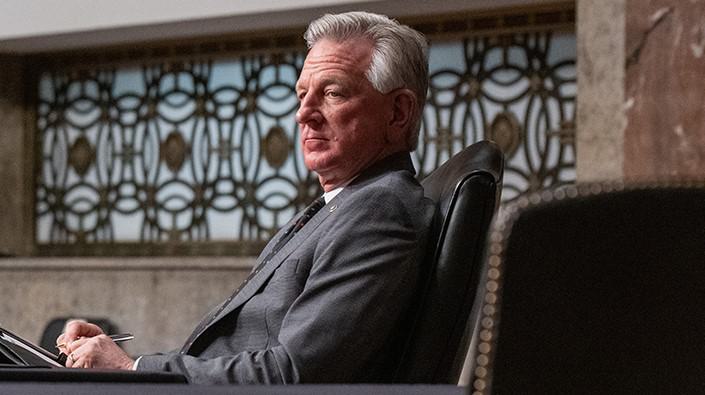By Brandon Moseley
National Health officials answered questions from U.S. Senator Tommy Tuberville (R-Alabama) about the Wuhan Institute in China and the availability of monoclonal antibody treatments to treat COVID-19.
Dr. Anthony Fauci, Director of the National Institute of Allergy and Infectious Diseases (NIAID) at the National Institutes of Health (NIH), and Dawn O’Connell, Department of Health and Human Services (HHS) Assistant Secretary for Preparedness and Response (ASPR), answered the questions during a Senate Health, Education, Labor & Pensions (HELP) Committee hearing on the next steps of the COVID-19 response.
Fauci said the NIH is no longer funding the Wuhan Institute of Virology, the likely source of the virus leak.
“We are not funding the Wuhan Institute anymore,” Fauci told Tuberville. “That’s for sure, but I can’t testify to the scope of research that goes on beyond what the NIH funds.”
Fauci said the NIH is having ongoing conversations and collaborations with China.
“Certainly, there’s been a lot of stress and strain right now when you talk about the Wuhan situation, but our colleagues in Shanghai, our colleagues in Beijing–we communicate with them all the time,” Fauci said. “The Chinese have a very, very fine Centers for Disease Control and Prevention modeled against our own CDC. And our CDC is in very good collaboration and cooperation with them.”
Fauci agreed with Tuberville in his claim that if China had been more transparent during the beginning of the pandemic, the U.S. would not be in the state it is now.
“No, absolutely,” Fauci said. “And we want to find all the information we can, and the NIH and the entire HHS has been very much in favor of all transparency and getting to know all the information of what’s going on in China. We are all very much in favor of that. We want more transparency.”
Tuberville emphasized the importance of an “all of the above” strategy to combat COVID, including the use of therapeutics like monoclonal antibody treatments. He pointed out the hypocrisy in the Biden administration’s handling of congressionally appropriated COVID funds for these treatments. HHS has begun rationing the supply of monoclonal antibodies. Previously medical providers were able to order supplies directly from the manufacturer.
“John Hopkins University just made a report last week that this year we’ve lost 353,000 people (this year so far),” Tuberville said. “That’s how much we lost the entire year last year. It’s a little perplexing that, you know, we’ve got two vaccines boosters, and we got masks and all that. I recently wrote an op-ed talking about how we need an all-of-the-above approach. We need every tool in the toolbox to be used. We’ve been talking to doctors all over Alabama. We’ve had a tough problem. They’re very upset that they don’t have the freedom to treat like they should have the freedom to treat.
“Congress gave money through the CARES Act to help with development of production of therapeutics. Within three months of being in office, President Biden’s administration decided not to buy, or they declined to exercise contract options on monoclonal antibodies, and I know you weren’t there at the time.”
Tuberville said those changes led to shortages, especially for the people of Alabama.
“At the same time, the Biden administration was ramping [down] monoclonal production as we’re trying to (ramp it up),” Tuberville continued. “HHS turned and gave (a) $142 million non-compete contract to an accounting firm to market these treatments to the public. The administration hired KPMG to promote a therapeutic that the government stopped buying. That makes no sense.”
O’Connell responded to Tuberville after he asked about re-routing some of those funds to make monoclonals more widely available.
“We have seen a change in the monoclonal landscape,” O’Connell said. “When the Aspa Therapeutics team began looking at the distribution models in February, a lot different than we experienced during the Delta surge. Twenty-fold increase in demand for monoclonals, and we went to a state distribution system. And so you’re absolutely right. It’s time to re-evaluate whether we need this distribution help to get to the harder hit communities, and that review is under way right now. I’m expecting a memo any day with the team’s recommendations on whether to keep that funding going.”
Tuberville is serving in his first term representing Alabama in the U.S. Senate following his election in 2020.










